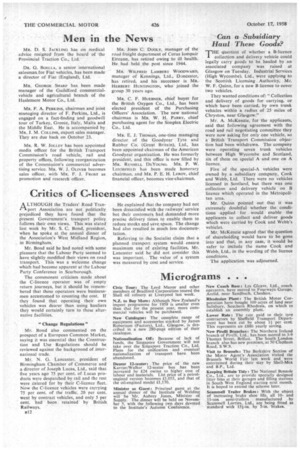Critics of C-licensees Answered
Page 46

If you've noticed an error in this article please click here to report it so we can fix it.
ALTHOUGH the Traders' Road Tranport Association are not politically prejudiced they have found that the present Government's transport policy follows their own views. This was stated last week by Mr. S. C. Bond, president, when he spoke at the annual dinner of the Association's West Midland Region, in Birmingham.
Mr. Bond said he had noted with some pleasure that the Labour Party seemed to have slightly modified their views on road transport. This was a welcome change which had become apparent at the Labour Party Conference in Scarborough.
The commonest criticism made about the C-licence operator was of empty return journeys, but it should be remembered that these operators were businessmen accustomed to counting the cost. If they found that operating their own vehicles was dearer than using hauliers they would certainly turn to these alternative facilities.
"Change Regulations" Mr. Bond also commented on the prospect of a European Common Market, saying it was essential that the Construction and Use Regulations should be reviewed against the background of international trade, Mr. N. G. Lancaster, president of Birmingham Chamber of Commerce and a director of Joseph Lucas, Ltd., said that five years ago 75 per cent. of Lucas products were despatched by rail and the rest were catered for by their C-licence fleet., Now the C-licence vehicles were carrying 75 per cent, of the traffic, 20 per cent. went by contract vehicles, and only 5 per cent, had been retained by British Railways.
B12
• He explained that the company had not been dissatisfied with the railways' service but their customers had demanded more precise delivery times to enable them to reduce stocks and save space. The change had also resulted in much less documentation.
Referring to the Socialist claim that a planned transport system would ensure maximum use of existing facilities, Mr. Lancaster said he did not consider this was important. The value of a system was measured by cost and service.




















































































































